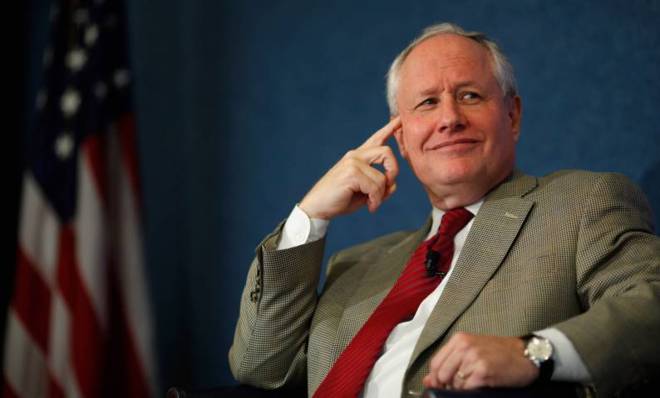On foreign policy, hawks blame America first
Nothing is more ruinous to American power than overestimating our influence


A free daily email with the biggest news stories of the day – and the best features from TheWeek.com
You are now subscribed
Your newsletter sign-up was successful
America's foreign policy hawks are in agreement on one thing: Everything is now America's fault.
Here's Bill Kristol, in The Weekly Standard:
Kiev is ablaze. Syria is a killing field. The Iranian mullahs aren't giving up their nuclear weapons capability, and other regimes in the Middle East are preparing to acquire their own. Al Qaeda is making gains and is probably stronger than ever. China and Russia throw their weight around, while our allies shudder and squabble.
Why is this happening? Because the United States is in retreat. What is the Obama administration's response to these events? Further retreat. [Weekly Standard]
He's not alone. Matt Continetti, editor of the Washington Free Beacon, starts his latest column "reading news of disorder and upheaval from Venezuela to the Levant to Ukraine to Iraq to Afghanistan," and comes to a similar conclusion about America's "fecklessness."
The Week
Escape your echo chamber. Get the facts behind the news, plus analysis from multiple perspectives.

Sign up for The Week's Free Newsletters
From our morning news briefing to a weekly Good News Newsletter, get the best of The Week delivered directly to your inbox.
From our morning news briefing to a weekly Good News Newsletter, get the best of The Week delivered directly to your inbox.
In The Wall Street Journal, Niall Ferguson lists a similar parade of global horribles, but also drills down to say that American "inaction" has resulted in the deaths of 130,000 Syrian civilians and the exile of 9 million others. For good effect, he adds 11,000 torture victims to the docket of American crimes of omission.
These chest-beating mea culpas have a few notable features. First, they are predictable. For neoconservatives and muscular liberals alike, even the peace dividend of the 1990s would be as alarming as a series of revolutions across the Middle East.
The second feature is their odd understanding of causality. Hawks put the moral guilt for Bashar al-Assad's crimes on an American president and an American public that have no appetite to intervene and stop them. This assumes that every government on earth acts only as we permit them to act.
But when America is "active" in the region, causality disappears. Writes Continetti: "The ability of non-monarchical Arab governments to control their populations has collapsed, creating an arc of stateless space that begins in Libya and Egypt, is briefly interrupted by the tiny, embattled, belittled, and bullied Jewish State, and extends through Lebanon into Syria and western Iraq."
A free daily email with the biggest news stories of the day – and the best features from TheWeek.com
Their "ability" has collapsed? Geez, how did that happen?
Let's see. The U.S. gave air support to Libyan rebels it didn't know or understand when they set about destroying the Gadhafi regime. In Egypt, the U.S. propped up for years a hollowing regime under Hosni Mubarak, and then gave its imprimatur to two successive transitions of government; the first resulted in democratically approved rule by the Muslim Brotherhood, and the second led to de facto rule by the military. In Syria, the U.S.'s involvement in extending a stalemated civil war has been lighter and more covert — "feckless" is the preferred term of critics. And despite all our efforts at liberation and democratic tutoring, Iraq has not turned into Bethesda along the Tigris.
If anyone caused this region to collapse into an "arc of stateless space," it was the United States.
Thirdly, the idea that America is in retreat is hysterical gibberish. It can only be made plausible if one takes the immediate years after 2001 as the normal state of American foreign policy, or if you consider the emergence of any regional power (whether it be Iran or Russia) a dire threat. The U.S. still maintains 20 large foreign military bases around the globe, including some 70,000 troops stationed throughout Europe. Any diminishment of our war footing initiated by the Obama administration over his last years in office will leave America far and away the largest military force on the globe, better equipped and more easily deployed than any of its rivals.
America's hawks should have learned two things over the last decade and a half of war and passionate engagement across the globe. First, American power has limits. The United States can knock over regimes, but liberal democratic governments do not emerge spontaneously in the aftermath, even if you try to manage them as closely as the United States has done in Afghanistan and Iraq.
That's not a comfortable lesson, but the next should provide some solace: the United States has such a surfeit of power, it can make large and costly foreign policy mistakes and retain its global standing.
But even if the United States has a luxury to fail, it still must husband its military and moral resources to meet more imminent threats. Nothing could be more counterproductive in that effort than imagining that America is omnipotent, and therefore that any evils that exist in the world exist by our permission.
Michael Brendan Dougherty is senior correspondent at TheWeek.com. He is the founder and editor of The Slurve, a newsletter about baseball. His work has appeared in The New York Times Magazine, ESPN Magazine, Slate and The American Conservative.
